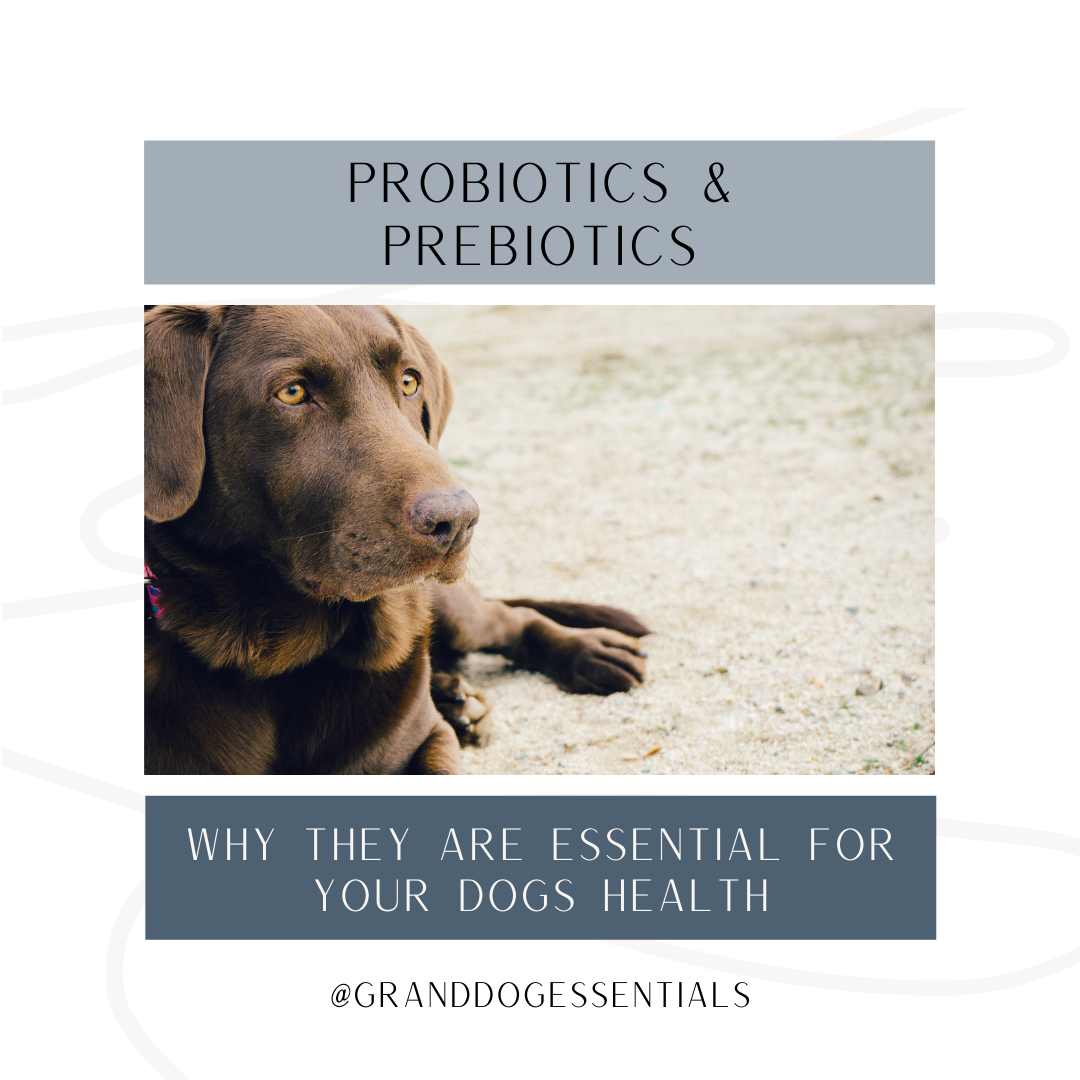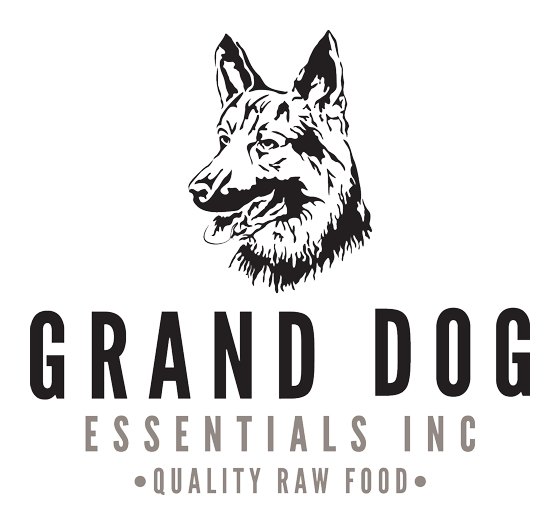Probiotics & Prebiotics: Why They are Essential for your Dogs Health
January 26, 2022 – Amanda Monsma

Research is consistently showing the importance of a healthy gut and how it directly affects a dog's overall health. Creating a healthy gut environment is the foundation of your dog's immune system. Poor gut health is connected to many of the ailments affecting dogs today: obesity, allergies, premature aging, yeast infections, chronic digestive issues.
Feeding a fresh food raw dog food diet is one important part of the puzzle when creating a healthy gut environment. The second important aspect is building a supply of good bacteria: probiotics.
A Dog's Microbiome
Every dog has their own unique make up of bacteria that lives inside and outside their body. Inside their gut lives a community of bacteria and microorganisms that create the microbiome.
A healthy microbiome plays an important role in protecting your dog from:
- Fungi like yeast (Learn more here)
- Pathogens like Salmonella & E.coli (Learn more here)
- Viruses like parvovirus or distemper
- Dental Disease
- Developing food allergens
- Gut Dysbiosis (Leaky Gut syndrome)
- Environmental toxins
Factors like diet, medication, aging, and stress can create an imbalance of bacteria. When this imbalance occurs, symptoms for the above can start to pop up.
In order to keep the microbiome healthy, it's important to ensure the good bacteria (probiotics) outweigh the bad bacteria (pathogens). Probiotics and pathogens compete for food and room in the gut; when there is no room for the pathogenic bacteria, it starves and is unable to grow and multiply. Leaving the probiotics to thrive and ensure your pup is healthy and happy,
The Good Bacteria - PROBIOTICS
Let's break down the word Probiotic. "Pro" is derived from Latin meaning "For". "Biotic" is a Greek adjective meaning "life", "lively" or "fit for life". It is fitting that the literal meaning of the word is "for life", driving home the message that probiotics are an essential aspect of a balanced fresh raw dog food diet.
Probiotics are the good bacteria found in the microbiome of living beings. There are also certain yeast species that are also consider probiotics.
Probiotics are essential for:
- Balancing the PH levels in your dogs gut
- Supporting proper digestion
- Supporting the immune system
- Producing key vitamins like Vitamin K and B
- Regulating your dog's mood
- Crowding out harmful bacteria
- Producing enzymes which help break down food and absorbing nutrients efficiently
- Dental Health
- Absorbing nutrients like calcium, magnesium and iron
- Creating a protective barrier against cancer causing toxins, drugs, allergens, heavy metals
What are PreBiotics?
Prebiotics is the soluble, non-digestible fibre from food that helps the communities of good bacteria thrive and grow. Without prebiotics, the friendly bacteria will have a hard time surviving and fighting for space against pathogens.
Buying a probiotic that contains prebiotics will ensure you're getting the most out of the product. You can also ensure your dog is getting natural sources of prebiotics through their diet. Those sources include:
- garlic (garlic is safe when fed properly, learn how to serve garlic here )
- banana
- asparagus & okra
- apples
- Mushrooms: Turkey Tail, Chaga, Reishi, Maitake (Our Immunity Mushroom mix has got you covered!)
- endive, escarole, radicchio
- dandelion (the whole plant is safe to eat, just make sure it hasn't been sprayed)
- cruciferous vegetables (broccoli, cauliflower, arugula)
How to Choose A Probiotic
When it comes to raw feeding, the golden rule is to feed a variety of foods to ensure your dog is exposed to a variety of nutrients. This also applies to probiotics. When looking for probiotics, take note of the amount of Colony Forming Units (CFU) are included.
Colony forming units (CFU) refer to the amount of bacteria or cells that will have the most success in multiplying and surviving the highly acidic gut of your dog. Feeding probiotics with a wide range of CFU's will help diversify and strengthen your dog's gut.
When it comes to choosing probiotics, there are certain strains that are proven to be most effective for dogs. It also depends on your dog's needs - short term and long term. Here are the ideal options to look for:
Spore Forming Probiotics
Spore forming - Bacilli - have a hard coating which protects against heat, acidity, and most antibiotics. Spore forming are soil based and commonly found in the ground or water. Because these probiotics have the best chance to survive the acidic gut of your dog, the CFU count doesn't need to be high. For spore forming, look for options with 1 billion CFU.
Spore forming bacterias are: Bacillus Coagulans, Bacillus Indicus, Bacillus Subtilis
Spore forming bacteria is the ideal option for daily, preventative use due to their hardiness and the fact that it's less likely to create small intestinal bacterial overgrowth (SIBO) in your dog. More on this below.
Soil based probiotics is also known to help manage inflammation in the body. Inflammation is a normal process, but when it becomes chronic it can lead to allergies, leaky gut, and autoimmune diseases. One research study shows that Bacillus strains helped prevent and manage arthritis in rats.
For soil based probiotics, check out the daily probiotic Protect from Four Leaf Rover in our shop!
Lactic Acid Probiotics
Lactic acid probiotics - Bifidobacterium and Lactobacillus - are typically found in fermented milk. They are the most common probiotics used in dog supplements. While they aren't as hardy as the spore forming probiotics, they can still provide some health benefits like inhibiting growth of harmful bacteria, create positive affects on a dogs mood, and manage skin conditions.
Specific lactic acid strains you might see are:
- Lactobacillus Acidophilus
- Lactobacillus Casei
- Lactobacillus Plantarum And Lactobacillus Rhamnosus
- Bifidobacterium Animalis
- Bifidobacterium Longum
- Enterococcus Faecium
- Pediococcus Acidilactici
Because lactic acid bacteria is not as hardy as spore forming, a higher CFU count is required. For a healthy dog, 10 billion CFUs should be enough. Dogs with immune or digestive issues should receive 25-50 billion CFUs (medium to large sized dog). Adored Beast Love Bugs is a lactic acid blend in our shop which contains 14 strain probiotic with 30 billion allergen-free CFU.
A study from 2018 suggests that Lactobacillus is not the best choice to help repair a microbiome after a round of antibiotics. This study showed that repair was less complete and slowed down compared to a group who was given no probiotics. The ideal options to be paired with antibiotic use is spore forming as previously mentioned or a probiotic yeast called Saccharomyces boulardii.
Probiotic Yeast
Saccharomyces boulardii is a type of yeast that works like a probiotic. S. Boulardii is unique for its ability to help dogs who suffer from chronic diarrhea or diarrhea caused by antibiotic use.
Just like spore forming bacteria, S. Boulardii is very hardy and a smaller amount of CFUs are required. Look for options that are half billion to 5 billion CFU. This blend from Four Leaf Rover will be the right fit.
S. Boulardii can be found in Bifido for Fido (BFF) - a blend of probiotics designed to support dogs with chronic digestive issues. Due to its strength, BFF is meant to be used only temporarily during digestive bouts and once symptoms subside return to using Protect on a daily basis.
Food Sources of Probiotics
Food sources of probiotics for dogs include fermented foods like sauerkraut, kefir, tripe and kimchi. When sourcing sauerkraut or kimchi, make sure to assess the ingredients to ensure there are no off limit foods for dogs included and the salt content isn't too high.
For dogs who suffer from Yeast Infections or SIBO, fermented foods can irritate the gut rather than help it, so it's best to steer clear from these sources in these cases.
When Not to Use Probiotics
Small intestine bacterial overgrowth (SIBO) occurs when a large amount of bacteria stakes their claim in the small intestine instead of the colon where it ought to reside. This overgrowth means that feeding more probiotics might create more harm than good. If your dog has the symptoms below and are getting worse with the use of probiotics, it's possible your dog has SIBO.
- Chronic or intermittent diarrhea
- Weight loss
- Gastresophophageal reflux disease (GERD)
- Gas
- IBS (or inflammatory bowel disease)
- Food intolerances
- Skin issues
- Leaky gut
If this is your experience, your best option is spore forming bacteria. The hard casing allows the bacteria to travel to the colon, staying in its spore state until it's in a safe space to be released.
How Often Should I Give Probiotics
Most dogs do well with taking probiotics every day as a preventative health measure. The best option for daily use would be soil based probiotics (PROTECT).
If you find that it upsets your dogs stomach, then daily might not be the best option. It may require some trial and error to find a routine and blend that works best for your pup.
I hope you found this article helpful! Feel free to leave a comment or question below!
Amanda Monsma (she/her)
________________________________________________________________________
If you liked this, you might also like:
What Your Dog's Poop is Telling You
________________________________________________________________________
SHOP FOUR LEAF ROVER PROBIOTICS & SUPPLEMENTS
_________________________________________________________________________
RESOURCES:
Prebiotics: Definition, Types, Sources, Mechanisms, and Clinical Applications
Dog Probiotics: How to Waste Money
Probiotics for Dogs: Do They Work?
The Forever Dog by Rodney Habib and Dr. Karen Becker
Prebiotics: Why Probiotics are not enough!
Disclaimer: All information presented on this website is for informational and/or educational purposes only and based on our experience and those shared by our clients. These statements have not been evaluated by a veterinarian. This website is not intended to diagnose, treat, cure, or prevent any disease and is not intended to be a substitute or replacement for any medical treatment. Please seek the advice of a holistic veterinarian for your dog’s specific health concerns.

0 comments